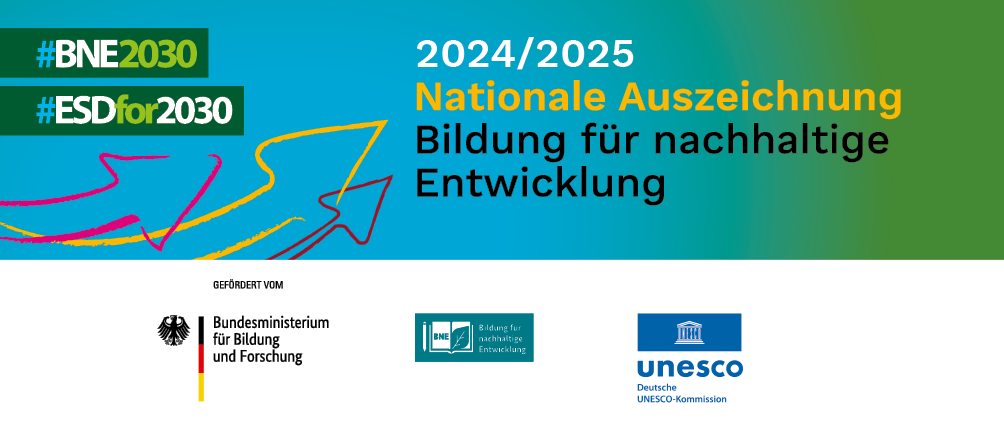
h_da SUSTAINABLE
Darmstadt University of Applied Sciences sees itself as an incubator for sustainable development. As a scientific institution in particular, we see a special responsibility and want to make a contribution to ensuring that the foundations of life on earth are secured for all people in the long term. Sustainable Development therefore seeps through everything we do: Teaching as well as research, transfer and operations.
A consistent approach to sustainability
Sustainable development is not only an integral par of many of the programs we offer, but is also the subject of many initiatives. This is why we have already been recognized four times by UNESCO and the Federal Ministry of Education and Research as a role model for sustainable development. In research and transfer, we are focused on making concrete steps towards sustainable development, i.e. social, technical and organizational innovations. These are developed in a wide variety of projects - from didactic research to large transformative projects in which internal and external stakeholders work together, but also in dissertations in Germany's first doctoral program for sustainability sciences. The university is also an institutional member of the German Society for Sustainability at Universities (DG HochN) - a nationwide exchange and expert platform for the advancment of sustainable development in the higher education system.
The Green Office is the central point of contact at h_da for internal and external issues relating to sustainable development.
Sustainability Management is responsible for h_da’s strategic orientation towards sustainable development and embedding sustainable development at the structural level of university administration.
Study and teaching
National Award - Education for Sustainable Development
The Federal Ministry of Education and Research and the German Commission for UNESCO recognized h_da as a role model for sustainable development for the first time in 2014 and again in 2017, 2019 and 2021. The independent jury thus recognized h_da’s consistent focus on sustainable development – not only in teaching and research, but also in operations and networking with regional partners – as an excellent initiative in the UNESCO program "Education for Sustainable Development: Achieving the Global Sustainable Development Goals (ESD 2030)".
Sustainability in every degree program: Accompanying studies in social and cultural sciences (SuK)
A special feature of Darmstadt University of Applied Sciences are the accompanying studies in Social and Cultural Sciences (SuK). Theses studies provide students from all degree programs with skills in social, economic, political, legal, scientific and cultural issues. Major changes such as digitalization and sustainable development play a central role in the Darmstadt model. Students here may choose from an extensive portfolio of topics.
The accompanying studies have been offered since the university was founded and are unique as an integral part of student education in the German university landscape.
Study programs and initiatives

Sustainable development is not a topic imposed from above at Darmstadt University of Applied Sciences; on the contrary, it has grown over the years through numerous initiatives and working groups. The Sustainable Development Initiative (i:ne) and a regularly held lecture series for interested people from across all faculties play an important role in this. At the same time, sustainable development is the subject of entire degree programmes as well as study specializations.
The new prize for final theses on sustainable development (pra:ne), which is awarded from students to students, provides additional motivation to engage even more with topics of sustainability.
Research, development and transfer
The role of h_da as a University of Applied Sciences is a special incentive when it comes to sustainable development. For us, this entails pursuing research at the highest level, without losing sight of its social implications. Our aim is to develop tangible solutions with our findings and, above all, transfer them into practice.
Three important institutions deal exclusively with sustainable development:
- The Doctoral Center for Sustainability Sciences offers an academic degree of Doctor of Sustainability Sciences (Dr. rer. sust.) that is unique in Germany.
- The Research Center for Sustainable Processes and Procedures (fz npv) brings together researchers from various disciplines; it carries out externally funded projects on sustainability and provides an infrastructure for an ongoing exchange on methods and procedures in applied research.
- The Innovation and Transfer Platform for Sustainable Development (itp:ne) brings together stakeholders from science, business and society and aims to establish processes for sustainable development with them. The ITP also supports researchers with communication and knowledge management for transdisciplinary research. The associated citizens' panel systematically incorporates the perspectives of citizens into the transfer and design of change processes in the region.
In addition, numerous departments and other institutions from disciplines such as design, journalism, materials and process technology, online communication or business have :ne focal points in research and transfer - and finally, there are numerous externally funded projects on sustainable development.
Contact
Vice President for Research and Sustainable Development
Prof. Dr. Nicole Saenger
Communication Office: C10, 14.05
Green Office
greenoffice@h-da.de
Sustainability management
nachhaltigkeitsmanagement@h-da.de
